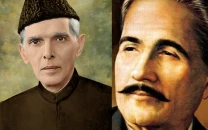Circular debt: Power sector liabilities may cross Rs1 trillion by 2014
Incoming govt faces a series of tough choices in order to resolve the energy crisis.

Incoming govt faces a series of tough choices in order to resolve the energy crisis. CREATIVE COMMONS
Barring significant and upfront increases in electricity tariffs, the incoming Nawaz administration will face an energy sector debt that is rapidly approaching Rs1 trillion.
According to water and power ministry officials, the existing stock of liabilities in the energy sector is around Rs500 billion, but this number does not include several other liabilities that are about to arise. Among these is approximately Rs200 billion in fuel cost adjustments that the National Electric Power Regulatory Authority was not able to approve during the fiscal year that ends June 30, 2013.
The power tariff in Pakistan consists of two components. The first is the base tariff which is supposed to account for the operational and maintenance costs, financial costs and allowed returns on equity for investors in the power sector. The second component is the fuel cost adjustment, which varies from month to month, depending upon average fuel prices and fuel mix of a power producer.
In June 2012, power distribution companies filed petitions with Nepra to allow them to raise tariffs for the higher costs faced during the outgoing fiscal 2012. Under pressure from the previous administration, Nepra refused to take a decision on the matter, leaving those liabilities to pile up during almost the entirety of fiscal 2013. Meanwhile, an additional complication arose when the law ministry term retroactive increases in power tariffs illegal.
But the power companies cannot make their costs go away and will claim that Rs200 billion as part of their next request for tariff adjustments at the start of fiscal 2014.
In addition, Nepra had planned to raise electricity tariffs by an aggregate amount of another Rs200 billion in order to reduce the cost of power subsidies in fiscal 2013. That did not happen and unless the incoming Nawaz administration makes the decision to implement that rise, it will face a massive subsidy bill.
“The new government has no choice: either it will have to charge consumers for two years worth of piled-up liabilities or else it will face a Rs600 billion subsidy bill in its first year in office,” said one person familiar with the matter.

That amount does not include the existing stock of Rs500 billion of circular debt, taking the government’s total liabilities during its first year in office to Rs1.1 trillion.
As the Pakistan Muslim League Nawaz prepares to take office, the party leadership is considering energy its top policy priority and is finalising the various components of its plan to tackle the problem. Among the policies under consideration are cutting power supply to Karachi in order to increase supply to Punjab, privatising gas production and distribution companies, and borrowing money from Saudi Arabia to pay all or most of the Rs500 billion in existing circular debt.
The decision to cut power to Karachi would be a problem. The Karachi Electric Supply Company has a contract to buy 650 megawatts from the state-owned National Transmission and Dispatch Company. But if that supply is cut, the Sindh government is likely to retaliate by reducing natural gas supply to Punjab. Sindh produces over 70% of the nation’s gas and, constitutionally, has the right of first use on that gas. PML-N’s rival Pakistan Peoples Party has a majority in the Sindh Assembly.
Sources say that while the PML-N is willing to consider raising tariffs, it also wants to reduce the cost of generating electricity by shifting more power plants to natural gas. In a bid to better manage the natural gas production and distribution, the PML-N is considering privatising the state-owned distribution companies Sui Northern Gas Pipelines and Sui Southern Gas Company as well as the state-owned hydrocarbon producer Oil and Gas Development Corporation.
In addition, the PML-N is considering removing the managing directors of the state-owned power distribution companies, in a bid to improve their efficiency and reduce power theft, particularly in urban area. Theft of power is the single biggest cause of the current power crisis. The PML-N is also considering cutting off power supply to entities that have not paid their bills and only restoring it after installing pre-paid meters.
The PML-N also wants to appoint an adjudicator to resolve the dispute between the power companies and provincial governments. The power companies claim that the provinces owe Rs110 billion in unpaid bills.
Published in The Express Tribune, May 26th, 2013.
Like Business on Facebook to stay informed and join in the conversation.



















COMMENTS
Comments are moderated and generally will be posted if they are on-topic and not abusive.
For more information, please see our Comments FAQ